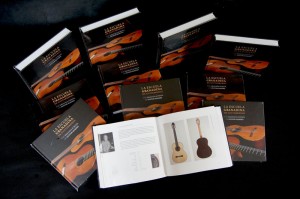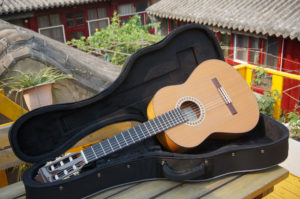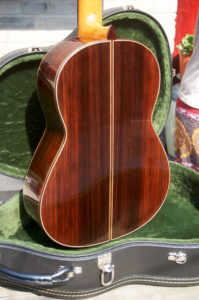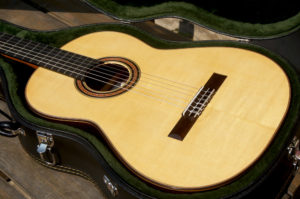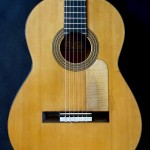在jitamen.com几星期前做的这篇有意思的专访中, Eva Beneke 向我们提到了她的中国之行,她对于中国古典吉他及吉他弹奏家的见解,对她影响最大的老师们: Pepe Romero(佩佩.罗梅罗), Scott Tennant(斯科特),Müller -Pering(穆勒)等,以及她最喜欢的音乐作品和很多课题。在这里你可以看到Eva Beneke这篇专访,她的简介,视频以及图片。
Eva,非常感谢你来到jitamen.com,给我们一些时间来谈谈你为吉他手的一些事。
你来自于一个有着悠久的传统音乐和古典吉他乐的国家,这是众所周知的,世界最好的吉他教师之一就在德国音乐大学。你在德国学习古典吉他,但后来你决定转移到美国,在这里首先你继续学业,而后现在你又作为一个古典吉他手举办音乐会并进行教学。是什么原因让你从德国来到美国的?
毫不客气的说:我搬到美国只是出于好奇。我一直想在另一个国家生活,当我得到了南加州大学的奖学金,这就是个机会。在这一点上我没有那么热衷于当一个学生,但得到来自南加州大学的博士学位,在很多方面帮助了我,尤其是在专业上。当然,洛杉矶对于体验网络和音乐行业工作是一个奇妙的地方。还有什么地方的工作能够得到这样的经历呢?
话虽这么说,我要解释,我还是怀着欧洲心的 – 文化,饮食,习惯,喜好和品味……这些大概都是不会改变的。我基本上是“德国制造” – 这在移居美国的早期生活中作为青年人可能把我跟其他朋友区分开来。多年来,尽管生活在美国有很多优点,我仍然挣扎在思乡之情和疏离感之中。
在吉他事业上,你认为谁是最有影响力的吉他手和教师?有可能的话,也许你可以谈论一些特别的东西,建议,评论等。在你作为吉他手的生涯中你领悟到这些并且出于某种原因你把它们看做弹奏和演绎的关键所在。
我是令人难以置信的幸运,在吉他之路上能跟随伟大的音乐家学习。我所有的老师中,托马斯•穆勒(Thomas Müller-Pering)可能是影响最大的。不仅作为一个音乐家,同时也作为一个有影响力的老师和人。对所有他的学生来说他就是这样的榜样。最大的阻碍很可能就是致力于细节和刻意练习,我作为十几岁的年轻学生挣扎其中。即使到了今天,他仍以身作则的告诉我,最好的老师是我们自己的耳朵和期望。如果你问我的学生,这可能也是这些天我教学的主要议题之一。
例如,措辞是一种音乐形式被表现之前一个明确的指向。换句话说,我们在练习时所不追求的东西是不会神奇地出现在舞台上的。
在另一方面斯科特•田纳特(Scott Tennant),以及伟大的爵士乐吉他手布鲁斯•福尔曼(Bruce Forman)教我放松,别紧张,原谅自己的错误,只是享受这个过程多一点。所以,这点也是很重要的!
从佩佩•罗梅罗(Pepe Romero)那里我学会了尊重自己的身体 – 这可能不知道的很多,但佩佩是在一个真正的解剖专家,有一整套的方法,包括呼吸和思维。这和冥想差不多。我从来没有见过任何人像他那样教学。如果你有机会就去倾听一下罗梅罗大师。这是很宝贵的。
最终,学生几乎总是会从老师那里拿走些什么。不是非得要成为一个“明星” -当然,能与Martin Rennert, Scott Tennant, Bruce Forman, Pepe Romero一起研究,我是幸运的。但如果学生是没有准备好,是不会倾听或理解的。在另一方面,如果他们愿意,他们将从几乎任何人那里学到东西!
Eva Beneke < Bach > 吉他: Raya Pardo 1988 (Beijing, China 2015.08)
你能告诉我们哪些是你最喜爱的曲子或作曲家,它们在你的作品里有何特殊地位?以何种方式,作为一名德国人,成长在一个有着西方古典音乐和盛产著名的古典作曲家的国家,是如何影响或诠释你的作品的?
这些都是重要的问题。我经常思考这些。当我去德国的音乐学院,我们密切注意西方古典音乐的传统。打破它是真的很难做的,不可取的。在德国,有一种师傅和学徒的文化 – 这意味着,你不应该试图改变一些东西,除非你已经掌握其核心思想。
当然,那是一个崇高的追求。作为一名学生,结果不是我们的期望可能导致陷入完美主义和绝望的圈子。作为艺人,我们每天都与这种情感抗争。
这对于古典吉他尤为难,其中最简单的小不精确(我甚至不使用单词“错误”在这里)导致音乐缺陷:一个失误,噪声,音调产生的延迟。那么,什么情况是我们的知觉马达控制失败,因为我们试图控制的太多了!
那么这如何解释?在高压性能的情况下,只有那些自小培养做什么都“正确”的人才能真正依靠自己的播放设备(肌肉和感官系统)。当谈到解释,我们需要一定的自由,轻松的方式来真正做到“讲”给观众 –只有当我们步上舞台的瞬间忘掉所有并专注于一首乐曲的情感内容才有可能办到这点。我知道这个答案似乎偏离你的问题- 但它确实没有。我只想说的是,无论是什么文化背景,对于作品真正理解来自于你进入它的强度和深度。例如:我喜欢巴赫(Bach) – 但如果我没有花几个小时研究措辞和发音,阅读书本,听其他音乐家 – 弦,乐团,清唱剧,歌剧咏叹调等,我作为一名德国人的事实没有多大帮助!
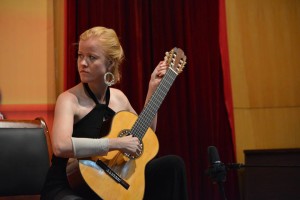
你已经两次在中国举办音乐会和授课等。你也听过许多中国吉他手和中国古典吉他学生的演奏。你对中国吉他在当今世界中的地位作何感想?
这是我第二次来到中国,我为在这里看到的才华和投入精神深深震撼。在中国,我遇到了一些最有纪律和敬业的年轻演奏家,其演奏水平是令人难以置信的。
在另一方面,我更想看到少“复制”欧洲的东西,更独具匠心一些。我知道这是一个很高的要求 – 比如说,一开始是在剧目进行。中国吉他手演奏的主要是我们在欧洲竞赛中10年甚至15年前的作品 – 很多Barrios, Sor,浪漫和经典作品。极少数人不知道巴洛克(baroque)或现代作品。该音乐品味是相当保守的,我认为对于年轻人来说被中国作曲家激发灵感是很好的。我想谈Tan Dun’s的吉他七欲望- 或其他,像很有意思的韩国作曲家Unsuk Chin作的吉他曲。在节日听听这些作品是多么激动!如果我知道一些令人兴奋的不同的事情将要发生在音乐会上,我会很高兴地收拾行装。
在教学方面,我觉得让年幼的孩子过早地打硬剧目是危险的。例如,在这次旅行中从来就看到一个8岁的孩子弹奏Rodrigo的“西班牙三重奏”!虽然这是非常,非常令人印象深刻,但我认为弹奏这个剧目需要音乐和情感的成熟度。 这就像喝着陈年美酒却把它当做5美金一瓶的廉价酒。或者是没学会语法就看小说。
你有什么建议给愿意投身于这个美好乐器的年轻的中国吉他手?
同样的事情,我也告诉了我的学生们:
– 音域要不单一
– 避免死记硬背的学习,并学习“乐”
– 研究你的作品:向后和向前发展。
– 音乐节可以扩大联络和启发灵感,而不只是为了竞争。可以寻求挑战,但寻求节日之外的其他演唱会为好。你的观众会欣赏它。
– 创造自己的机会(事业,表演,合演等)
– 保持好奇,激发灵感。
再次感谢您伊娃.贝内克(Eva Beneke)。祝你一切顺利,我们希望你能常来中国,这样就可以继续享受你的精彩演奏和你作为一个音乐家和吉他手广阔的鼓舞人心的知识和经验。
谢谢大家!我在北京度过了很愉快的时光,能与jitamen.com 的粉丝对话我感到很荣幸。希望不久能来到这里演奏和教学
贝内克(Eva Beneke) website: http://evabeneke.com/en/
email: eva.beneke@gmail.com
两周之前,Eva Beneke(伊娃.贝内克)造访jitamen.com时,她爱上了我们这里的一把吉他,并把它买了下来,这把吉他就是 莱亚·帕多Raya Pardo 1988。这把吉他将伴随她在世界各地的音乐会上演奏,我们为此感到非常荣幸。https://www.jitamen.com/raya-pardo-1988/
生平简介
Eva Beneke 出生于柏林,并在柏林艺术大学跟随Martin Rennert 教授开始其艺术生涯。她的突出才华把她引向了位于魏玛的Franz Liszt Hochschule 跟随德国最具影响力的吉他手-Thomas Muller-Pering学艺。
2012年,她以优异成绩获得了洛杉矶南加州大学的博士学位,在这里,她师从Scott Tennant,Pepe Romero和爵士吉他的传奇人物-Bruce Forman。
EvaBeneke 不仅在荷兰,意大利和美国举办的国际吉他艺术节上获得奖项,更是一名国际知名独奏家,室内乐音乐家和著名编曲家。她的作品在国内外广播电视上广泛流传,比如NPR的“今日表演”等。
其艺术生涯的亮点包括:与德国交响乐团KentNagano的合作,被邀请到秘鲁,墨西哥,德国,立陶宛,美国以及加拿大举办的国际音乐节,与Carrie Underwood在2010年度的美国乡村音乐奖颁奖典礼上现场表演,以及与格莱美获奖吉他手Scott Tennant合作其最新专辑-“In dulci jubilo -古典吉他圣诞节”。
2012年秋天,EvaBeneke 加入了位于明尼苏达州圣保罗市的McNallysmith 音乐学院的教学团队。
所获奖项及艺术成就
08-11 洛杉矶,美国
南加州大学桑顿音乐学院助教
2009 美国
因音乐方面的杰出成就获得Presser foundation奖
08-09 洛杉矶,美国
科尔博恩基金会早期音乐奖
2008 洛杉矶,美国
南加州大学康纳德米勒协奏曲大赛获奖者
2008 墨西哥
入围国际吉他竞赛
2007-09 洛杉矶,美国
获得纪念富兰克林亨特明德音乐奖学金
2006 魏玛德国
图林根州研究部助学金
2005年,荷兰
兹沃勒国际吉他艺术节二等奖(一等奖未颁发)
2004,美因茨,德国
音乐助学基金
2004,魏玛德国
图林根州研究部助学金
1997 萨鲁佐,意大利
国际吉他大赛一等奖
English
Interview with Eva Beneke by jitamen.com
Thank you very much Eva for give us some time to talk about you as a guitarist for jitamen.com
You are from a country with a large tradition for the music and the classical guitar and it is well known that one of the best guitar teachers in the world are there in German Music Universities. You studied classical guitar in Germany but at some point of your life you decided to move to US where first you continued studying there and now you work as a Classical Guitarist giving concerts and teaching. Which reasons made you move from Germany to US?
Bluntly speaking: I moved to the U.S. simply out of curiosity. I always wanted to live in another country, and when I got a scholarship for the University of Southern California, the opportunity was simply there. I was not so keen on being a student at that point, but getting the doctorate from USC has helped me in many ways, professionally and, of course L.A. was a fantastic place to network and experience the music industry at work. Where else in the work could I get that kind of practice?
That being said, I have to explain that I am really a European at heart – the culture, the food, my habits, my preferences and tastes…that is probably not going to change. I am basically “made in Germany” – and that distinguishes me from friends that moved to the U.S. earlier in live, as teenagers maybe. For many years I have – despite all the advantages of living in the States – struggled with homesickness and feelings of alienation.
Who do you consider to be the most influential guitarist and teachers you had during your guitar career? And if possible maybe you can talk about some special things, advices, comments… that you learnt with them and for some reason you keep as important key points in your playing, your interpretations and your life as a guitarist.
I was incredibly lucky to study with great musicians along the way. Of all my teachers, Thomas Müller-Pering was probably the biggest influence. Not only as a musician, but also as an influental teacher personality and human being. Such a role model, for all of his students. The biggest take-away was probably commitment to detail and deliberate practice, something I struggled with as a teenager and young student. Even to this day. He has taught me – by sheer example – that the best teacher is our own ears and expectations. If you ask my students, that´s probably one of the main topics in my own teaching these days.
For example, phrasing is a clear indicator of how clearly a musical form was perceived before its execution. In other words, what we don´t ask for in the practice room is not going to appear magically on stage.
Scott Tennant, on the other hand, and also the great jazz-guitarist Bruce Forman taught me to relax, take it easy, forgive mistakes and simply enjoy the process a bit more. So, so very important!
From Pepe Romero I learned to respect my body – it may not be known to many, but Pepe is a true expert on anatomy and has a sort of wholistic approach that includes the breath, and the mind. It is meditation, almost. I have never seen anyone teach the way he does it. If you get a chance, go listen to a Romero masterclass. It is precious.
Ultimately, a student is almost always going to take something away from a teacher. It does not have to be a “star” – I was lucky, of course, to study with Martin Rennert, Scott Tennant, Bruce Forman, Pepe Romero… but if the student is not ready, they´re not going to listen or understand. On the other hand, if they are ready, they will learn from almost anyone!
Can you tell us which pieces or composers are you specially fond of and they have an special place in your repertoire? And In which way you think the fact of being german and have being grew up in a country with such an strong tradition of west classical music and famous classical composers affect or take part in your interpretations?
Those are important questions. Things I think about a lot. When I went to music school in Germany, the tradition in western classical music was something we were intimately aware of. Breaking it was really hard to do, and not desirable. In Germany, there´s a culture of mastery and apprenticeship – meaning, that you shouldn´t attempt to change something unless you´ve mastered its core idea.
That is, of course, a noble pursuit. As a student it can lead to a circle of perfectionism and desperation when the result is not what our expectations dictate it should be. As artists, we struggle with those feelings daily.
This may be especially hard on a classical guitar,where the simplest little imprecision (not how I am not even using the word “mistake” here) leads to a musical imperfection: a buzz, a noise, a delay in tone production. So, what happens is, our perceptual motor control fails because we are trying to control too much!
How does this relate to interpretation? Well, only someone who has been trained to play things “right” from an early age on can truly rely on their playing apparatus (muscular and sensory systems) during a high-pressure performance situation. When it comes to interpretation, we need a certain freedom, a relaxed approach to really, truly “speak” to the audience – and that is only possible when we forget everything we´ve learned the instant we step on stage, and focus on the emotional contents of a piece of music. I know this answer seems to stray from your question – but it really does not. What I am trying to say is, that a true understanding of a composition comes from the intensity and depth we spend with it, no matter what cultural background.
For example: I love Bach – but if I hadn´t spend hours and hours studying the phrasing and articulation, reading books and listening to other musicians – strings, orchestras, cantatas, arias -the fact that I am German would not be of much help when attempting an interpretation!
You’ve been already two times in China playing concerts, giving masterclasses… you already listened many Chinese guitarists and Chinese Classical guitars students. What is the impression you have now about the China guitar world nowadays?
This being my second visit, I am absolutely in awe with the talent and dedication I see. In China, I have met some of the most disciplined and dedicated young players. The level of playing is incredible.
On the other hand I would like to see less “copying” of what has happened in Europe, and more originality. I know that is a lot to ask for – a start could be made in the repertoire, for example. The Chinese players play mostly the pieces we saw in competitions in Europe maybe 10, 15 years ago – a lot of Barrios, Sor, the romantic and classical works. Very few unknown baroque or contemporary pieces. The musical taste is rather conservative, and I think it would be good for young students to be inspired by pieces Chinese composers write. I am thinking of Tan Dun´s Seven Desires for Guitar – or others, like the very interesting Corean composer Unsuk Chin, who writes for guitar, too. What a thrill it would be to hear these pieces played at a festival!! I would gladly make the trip if I knew something exciting, different is going to happen in the concert.
In terms of teaching, I think there´s a danger in letting young kids play the hard repertoire too early. On this trip, for example, I´ve seen an 8-year old play Rodrigo´s “Tres piezas españolas”! While that is very, very impressive, I doubt that this achievement is backed up with the musical and emotional maturity it takes to play this repertoire. It´s like drinking a really nice aged bottle of wine thinking it´s a $5 one. Or reading a novel and not having learned grammar.
What do you suggest to young Chinese guitarist who wants to dedicate their life to this wonderful instrument?
The same things I tell my students:
- be more than one-dimensional.
– avoid rote learning, and learn “the music”
– study your pieces: backwards and forward.
– festivals are for networking and inspiration, not solely for competition. Seek the challenge, but seek other concert venies outside the festivals as well. Your audience will appreciate it.
– create your own opportunities (business, performing, collaborations etc.)
– stay curious and inspired.
Thank you very much again Eva Beneke. Wish you all success and we hope you continue to come to China many years more so we will be able to keep enjoying your wonderful playing and your vast inspiring knowledge and experience you have as a musician and guitarist.
Thank you! I have had a fantastic time in Beijng, and on this trip overall and I am so grateful for this opportunity to speak to the fans of www.jitamen.com ! It would be my hope to come back soon to perform and teach.
Eva Beneke website: http://evabeneke.com/en/
Biography
Born in East Berlin, Eva Beneke began her studies at the Berlin University of Arts with Professor Martin Rennert. Her success there led her to the Franz Liszt Hochschule in Weimar to study with Professor Thomas Müller-Pering, one of Germany’s most influential guitarists.
In 2012, she received a doctorate with honors from the University of Southern California in Los Angeles where she studied with Scott Tennant, Pepe Romero and jazz-guitar legend Bruce Forman.
In addition to prizes at international guitar festivals in The Netherlands, Italy and the U.S., Eva Beneke is an internationally acclaimed soloist, chamber musician and published arranger. Her performances have been broadcast nationally and internationally on radio and television, such as NPR´s “Performance Today”.
Highlights of her career include appearances with the German Symphony Orchestra under Kent Nagano, invitations to international music festivals in Peru, Mexico, Germany, Lithuania, the U.S. and Canada, a live performance with Carrie Underwood at the 2010 American Country Music Awards, and a duo-collaboration with Grammy-winning guitarist Scott Tennant (L.A.G.Q.) for her latest CD “In Dulci Jubilo – A Classical Guitar Christmas”.
In the Fall of 2012, Eva Beneke joined the faculty at McNallySmith College of Music in St. Paul, Minnesota.
Prizes, Scholarships And Awards
Los Angeles, USA 08-11 Teaching assistantship at USC Thornton School of Music
Los Angeles, USA 2009 Presser Foundation Award for Musical Excellence
Los Angeles, USA 08-09 Colburn Foundation Early Music Award
Los Angeles, USA 2008 Winner of the Donald Miller Concerto Competition at USC
Mexico, 2008 Finalist at the International Guitar Competition Culiacán
Los Angeles, USA 2007-09 Franklin Hunter Memorial Endowed Music Scholarship
Weimar, Germany 2006 Stipend of the Research Ministry of the State of Thuringia
Netherlands, 2005 2nd prize at the “International Guitar Festival Zwolle” (1st prize not awarded)
Mainz, Germany, 2004 Villa Musica Stipend
Weimar, Germany 2004 Stipend of the Research Ministry of the State of Thuringia
Saluzzo, Italy 1997 1st prize “Chitarrissima”, International Guitar Competition

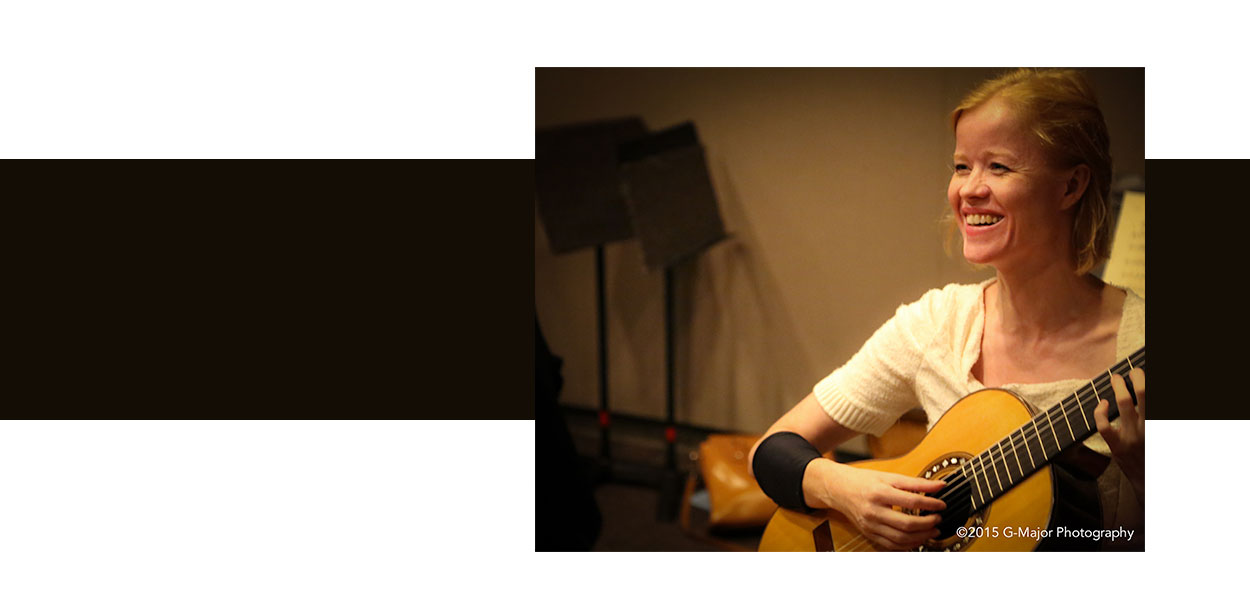
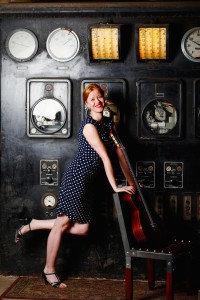
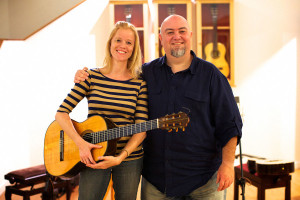
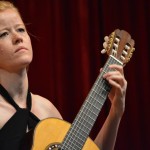
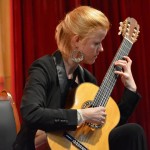
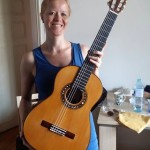
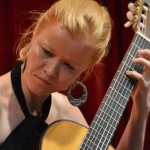
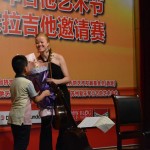
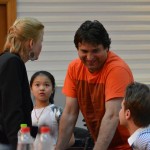
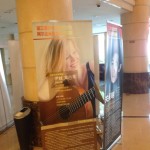


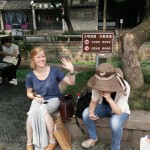
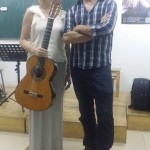
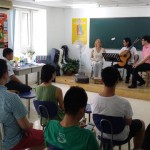

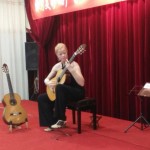
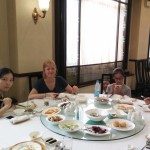
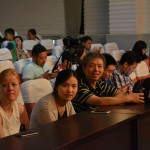
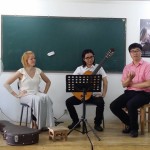
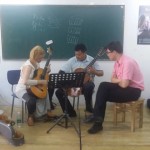
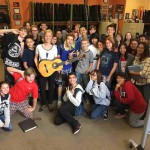
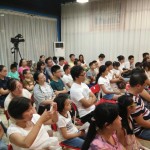

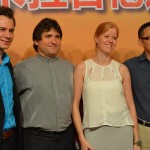
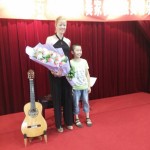

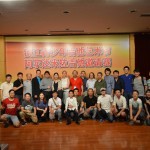

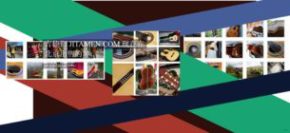
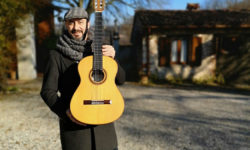
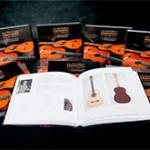
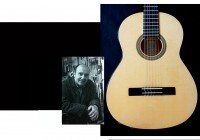
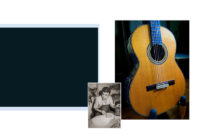
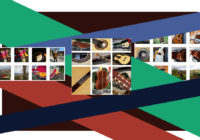
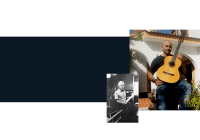
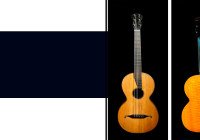
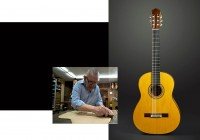

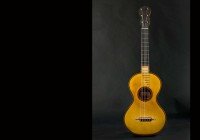

 吉他们 JITAMEN.COM 现在在北京出售的琴
www.jitamen.com/jitamenguitars/
吉他们 JITAMEN.COM 现在在北京出售的琴
www.jitamen.com/jitamenguitars/